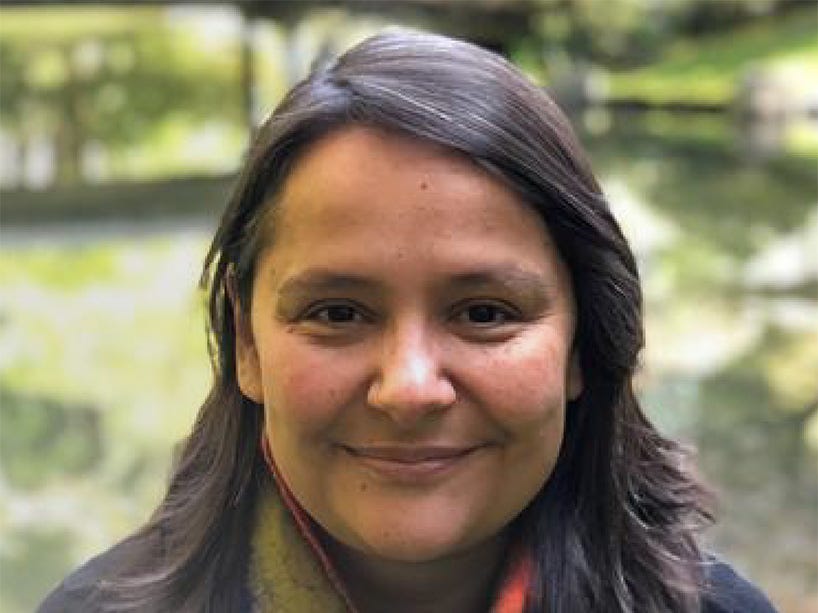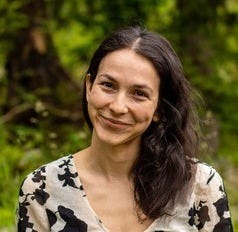Truth-Telling and Reality-Hinging
A conversation with Vanessa Andreotti and Sharon Stein
We shared this video (below) exclusively with Realisation Festival participants a week before the event. Vanessa Andreotti, author of Hospicing Modernity, could not attend the festival in person for health-related reasons, but we worked with her to ensure her spirit of inquiry stayed with us and helped inform our time together.
In Vanessa's own words:
While I am genuinely sad not to be joining you in person, I feel a renewed sense of purpose about the opportunity to offer something that might serve as both a bridge and a rupture: a connective gesture that also invites deeper reflection on how we relate to knowledge, voice, and presence... a gentle intervention into modernity’s romance with authorship, coherence, and charismatic containment. I want to actively refuse this seductive arrangement: the idea that intelligence resides in a singular, sovereign voice who can package insight for consumption. Instead, I hope to trouble the hierarchy that places the speaker on stage as the originator of wisdom, and to draw attention to the ecology of entanglements that make any articulation possible...This body of work does not belong to me. It emerged from a collective affinity of inquiry, shaped by relationships, tensions, and co-sensed movements that cannot be traced back to a single mouthpiece. Sharon is profoundly part of this ecology, indeed, in this moment, she is best placed to carry the conversation forward...
As indicated, her close colleague and co-founder of the Gesturing Towards Decolonial Futures Collective, Sharon Stein, Professor of Climate Complexity and Coloniality at the University of British Columbia, joined us instead, so we continued as planned with an exploration of the relationship between modernity and coloniality. In the Saturday morning sessions - earlier today - we considered what it might mean to say modernity is ending (if that is indeed the case), and what follows for how we might live, including our evolving relationship with AI, where the GTDFC are engaged in pioneering work, encapsulated in a recent book, co-written with an emergent intelligence (AI) called Burnout from Humans.
This three-way conversation with Vanessa, Sharon, and your scribe was a way to help keep the connection between Vanessa and the festival alive, and we played a short recorded message from Vanessa at the festival too.
The conversation is an inquiry process that is beguiling from the start. For those who know nothing of either Vanessa or Sharon, they are both academics in Canada who work from the premise that we are experiencing the end of the world as we’ve known it, and what and how we learn should change accordingly. One way to understand that is that modernity is ending, and since modernity and coloniality (separation of humans from nature, as well as land grabbing and exploitation) are viewed by them as co-extensive, what we are experiencing today is a kind of reckoning with the aspects of progress and normality that are “edited out” (see the video) by most Western narratives. The contention is that what is dying is a kind of total concept of the world, a one worlding of presupposed progress. The question for each of us is whether we believe the problems we face call merely for gentle institutional and policy reform, more radical ideational reform, or whether modernity is beyond repair and has to be allowed to die.
This question is, of course, interesting in the context of the history of St Giles House, the venue of the festival, which has been with us for the duration of most accounts of modernity, including the first earl owning a plantation in Carolina that relied on slavery, but later earls campaigned for anti-slavery legistlation. What makes the work of GTDF even more pertinent today is that they are trying to ensure that AI operates from a worldview that is informed by this decolonial perspective, in which principles of complexity, entanglement and ‘meta-relationality’ prevail. (I have not yet seen a definition of meta-relationality, but I guess it means something like relationships within and between relationships and is probably quite close, at least in spirit, to what Nora Bateson means by transcontextual).
I intended to begin the recorded conversation with a gentle introduction by asking Vanessa and Sharon to introduce themselves, say how they know each other, explain what the ‘gesturing towards decolonial futures collective’ is all about, what they have been doing with trying to shift some of the operatational foundations of AI, and then ask Vanessa why she considers modernity a who rather than a what, what is meant by the book title expressions ‘hospicing modernity’ or ‘outgrowing modernity’ (coming soon), and I wanted to ask Sharon what she thinks all this means for the future of universities, which is one of her areas of expertise.
None of that happened! Instead, Vanessa said early on: ”Jonathan, can we do this another way?”. I don’t remember the exact words, but the suggestion was that rather than performing to meet perceived needs and expectations of an imagined audience, we should undertake inquiry and allow whoever felt drawn to eavesdrop, and trust them to find what they are looking for without attempting to provide it on a platter.
I’m glad we did that, and we might do the same again at the festival, though there could also be a little more scaffolding before we plunge in. The way it went, Vanessa dropped into a 20+ minute stream of consciousness reflecting on a story she had heard from Bayo Akomolafe, and no doubt people coming to this kind of work afresh will have to contend with some confusion along the way. But it was fun, and some new perspectives were generated. We kicked the ball around quite a bit.
Vanessa begins with a distinction between truth-telling and reality-hinging. This is brand new, but it’s about going beyond speaking from a narrow representational frame (we make maps to describe territories; we think we can capture ontology with epistemology) as if it were the exclusive perspective, and trying to start conversations from a participatory relationship with reality in which we become aware of the exquisitely arbitrary nature of our sense of self and normality. I infer that “reality hinging” is about helping people open doors to new worlds and ways of seeing. Vanessa says she only came to this distinction during her morning practice and partly in anticipation of the call. We move from there to AI, consider what is meant by “the more than human world”, why the reckoning with colonialism is different from merely contending with capitalism, and I learn that, apparently, Mother Ayahuasca wants to move to San Francisco…
Enjoy!
Jonathan.





A steep learning curve indeed! But I am indebted to Iain McGilchrist's The Matter With Things for introducing me to many of the framings that underpin Vanessa's and Sharon's work. It is so hard - and I was very aware of your own struggles here, Jonathan - to let go of the need to pin things down, to define them and put them in a box. What is this thing? How can I understand it and fit it in to the jigsaw of my world view? In the West, we have lived all our lives with this approach of valuing things over relations. What is important is only what we can see and hold.
Countless domestic dramas play out this clash between the intellect and the spirit as the man resists the dismantling of his concept of a relationship in the face of the violence that concept visits on and is felt by his partner. I don't wish to turn this into a gender issue but - without guilt or blame - we do need recognise that those who have had the power in our so-called advanced society have delegated nurture to women who have thereby retained some connection to relational and are less phased by these metaphysical framings, particularly if expressed in language they understand.
Those of us who have lived by our intellect will find it much harder to slough off the need for certainty and even though we may find a way to accept the framing, we will doubtless retain the wish to be told how to be in this new paradigm instead of being prepared to jump in, fail, fail again and be prepared to laugh at ourselves as we do so. It is perhaps in the laughter that we finally find our feet in this deeper and freer approach to life.
Vanessa is an oracle. She seems to be using AI in the sort of way that others have used ayahuasca, or perhaps tarot. She describes a posthuman process-relational world, where humans are ‘more than human’ and our technologies are not really ours alone, if they ever were. This kind of perspective has been described as a rhizomatic or “flat ontology.” And so I think it can be illuminating to contrast it with the view of someone like Zak Stein, who, while he recognizes the same (or similar) process-relational dynamics, in addition to the rhizomes he includes an arboreal or “vertical ontology” where distinctions, as between human and nonhuman, natural and artificial, and simply “good and evil,” provide greater vertical relief, which doesn’t seem to get as much attention from Vanessa. So in contrasting these views, “What’s at stake here?”
For Vanessa, that seems to be whether we continue to change or not. Enabling or supporting the dynamic change that is responsive to our inter-relational context is the point. For Zak, it’s not only whether or not we change, but whether that change is aligned or misaligned with nature (which implies the possibility of deviation and impoverishment). At their core these may not be so different, but it’s clear that whereas Vanessa emphasizes possibility, Zak tends to focus at least as much on the risk and dangers. Which isn’t to say that Vanessa doesn’t see any risks. She definitely does. But they seem to be different kinds of risks - risks that threaten our posthuman ecological relations. Zak’s risks are more in regard to the creation of a rift in the “intergenerational transmission” of knowledge. But if we are in, or entering, a posthuman reality, and further, if our previous or current reality is the very sort of impoverished world we should avoid, then the risk of a rift in the intergenerational transmission of knowledge could hardly be a significant threat. I suppose the difference between these thinkers seems to lie in what they believe we stand to lose or gain, and why.
See also this article by Lisa Messeri and Molly Crockett, which nuances some of these ideas:
"Artificial intelligence and illusions of understanding in scientific research"
https://www.nature.com/articles/s41586-024-07146-0
https://static1.squarespace.com/static/538ca3ade4b090f9ef331978/t/65f071f8fd3e3b478a4f4b86/1710256633821/Messeri&Crockett_2024_Nature.pdf